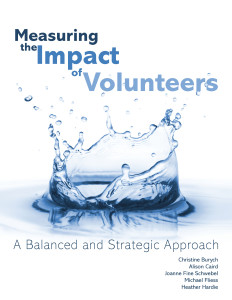 During a presentation on volunteers at a local government agency that I attended a few weeks ago, the program manager proudly noted that the agency’s volunteer contributions are the equivalent of 21 full time employees, and gave a value of their time at more than a million dollars, based on the dollar value per hour promoted by the Independent Sector. That was one of her very first points in her presentation, and this was the ONLY reason offered during the entire session as to why this agency involves volunteers; she then went on to what volunteers do.
During a presentation on volunteers at a local government agency that I attended a few weeks ago, the program manager proudly noted that the agency’s volunteer contributions are the equivalent of 21 full time employees, and gave a value of their time at more than a million dollars, based on the dollar value per hour promoted by the Independent Sector. That was one of her very first points in her presentation, and this was the ONLY reason offered during the entire session as to why this agency involves volunteers; she then went on to what volunteers do.
I wonder how the agency’s volunteers would feel to know that they are involved because they replace paid staff? Because they “save money”?
This agency said the greatest value of volunteers is that they are unpaid and mean the agency doesn’t have to hire people to do those tasks. I have so many, many examples on my blog and web site – linked at the end of this blog – regarding why those statements lead to outrage, and how they actually devalue volunteer engagement. These statements reinforce the old-fashioned ideas that volunteers are free (they are not; there are always costs associated with involving volunteers) and that the number of hours contributed by volunteers is the best measure of volunteer program success (quantity rather than quality and impact).
Put this in contrast to a paper on volunteer resource management practices in hospitals which I read today. The post about it on LinkedIn promotes this quote, “volunteers contribute greatly to personalizing, humanizing and demystifying hospitalization.” The paper, “Hospital administrative characteristics and volunteer resource management practices” is by Melissa Intindola, Sean Rogers, Carol Flinchbaugh and Doug Della Pietra and the description never once mentions the value of volunteers as being a monetary value for their hours, money saved, employees replaced, or any other old-fashioned statements to tout why volunteers are involved. I haven’t read the entire paper (it’s $30 – not in the budget right now), and maybe they do talk about these values, but from the summaries of the paper, it sounds like they understand the far better reasons for volunteer engagement, and that this understanding guides their recommendationss.
I’m not opposed to using a monetary value for volunteer hours altogether, but it should never, EVER, be shown as the primary reason volunteers are involved, or even the secondary reason to involve volunteers. If a monetary value is used, it should always come with MANY disclaimers, and should follow all of the other, better, more important reasons the agency involves volunteers. It should come many pages after the mission statement for the volunteer program and the results of volunteer engagement that have nothing to do with money saved.
Years of whining about this has paid off: the Independent Sector noticed yesterday and tweeted some responses to me. Not sure why it took so many years for them to notice my oh-so-public whining, particularly since I tagged them on Twitter every now and again…
I guess it’s time to again recommend this new book, Measuring the Impact of Volunteers: A Balanced and Strategic Approach, by ChristineBurych, Alison Caird, Joanne Fine Schwebel, Michael Fliess and Heather Hardie. This book is an in-depth planning tool, evaluation tool and reporting tool. As I wrote in my blog about this book, “I really hope this book will also push the Independent Sector, the United Nations, other organizations and other consultants to, at last, abandon their push of a dollar value as the best measurement of volunteer engagement.”
Also see:
- The Value of volunteers – a web page to help you understand how to appropriately talk about the value of volunteers at your organization.
- Initiatives opposed to some or all volunteering (unpaid work), & online & print articles about or addressing controversies regarding volunteers replacing paid staff – a page I developed when someone told me there was no opposition to volunteer engagement because of job loss and “money saved” (obviously, that person was wrong)
- Make volunteering transformative, not about # of hours – a blog from earlier this year that illustrates how to talk about the value of volunteers in a much more powerful way (and one that keeps getting retweeted! Thank you!)
- Valuing volunteer engagement: an imaginary case study – an attempt to show, in the simplest way possible, why talking about volunteer value primarily in terms of monetary value insults volunteers
- CNCS continues its old-fashioned measurement of volunteer value, a blog from 2014 – and, no, CNCS nor the Points of Light Foundation responded.
- OPB & Congress Think Volunteers are Free – how the Independent Sector way of thinking influences the press (and a petition for you to sign to help fund resources for volunteer management on public lands)
- Contradicting myself? – a blog about HistoriCorps and volunteers in California state parks and how to talk about why these initiatives involve volunteers (and how money CAN be talked about – just very, very carefully)
- We need volunteer police officers – & an overhaul as well – a blog that I hope really brings home a real-life value of volunteer engagement that has NOTHING to do with money
- Volunteering empowers, activates, builds, communicates – just another way of saying it….
- Volunteers: still not free – a 2012 blog that I think sums up the issues well
- Fight against unpaid internships will hurt volunteering – a blog that summarizes what I have predicted for many years: unpaid interns are revolting precisely because of the reasons given for not paying volunteers promoted by so many national and international bodies
- Advice for unpaid interns to sue for back pay – helping unpaid interns know their rights
- Judging volunteers by their # of hours? No thanks.
- Should the NFL involve volunteers for the Super Bowl? – a must read if you think the best value of volunteers is monetary
- Do NOT say “Need to Cut Costs? Involve Volunteers!” – a 2012 blog that tries to explain this issue in very simple terms
- UN Volunteers, IFRC, ILO & others make HUGE misstep – a 2011 blog in response to these international agencies promoting the value of volunteers in terms of money saved by not paying employees to do the work
- Value of Volunteers – Still Beating the Drum – a 2011 blog on the subject
- pro vs. volunteer firefighters – a 2013 followup to an earlier blog
- Another anti-volunteer union – a blog from 2010
- Volunteers are suing
- Criticism Continues for UK Government Talk Re Volunteers – a blog from 2011 that shows the backlash with the United Kingdom decided to cut employees and encourage volunteers to replace them
- International Association of Fire Fighters is anti-volunteer – a blog from 2010 that illustrates the consequences of the Independent Sector and other organization’s promotion of a monetary value as the best reason to involve volunteers.
- Volunteer engagement is MUCH more than just HR management – one of my first blogs on this subject

